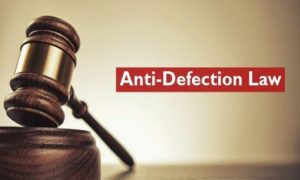Anti-Defection Law:

The Calcutta High Court has given West Bengal Assembly Speaker a deadline to pass an order in the defection case involving a Member of Legislative Assembly (MLA).
- Anti-defection proceedings are also going on in other states such as Jharkhand and Rajasthan.
- The anti-defection law punishes individual Members of Parliament (MPs)/MLAs for leaving one party for another.
- Parliament added it to the Constitution as the Tenth Schedule in 1985. Its purpose was to bring stability to governments by discouraging legislators from changing parties.
- The Tenth Schedule – popularly known as the Anti-Defection Act – was included in the Constitution via the 52nd Amendment Act, 1985 and sets the provisions for disqualification of elected members on the grounds of defection to another political party.
- It was a response to the toppling of multiple state governments by party-hopping MLAs after the general elections of 1967.
- However, it allows a group of MP/MLAs to join (i.e. merge with) another political party without inviting the penalty for defection. And it does not penalise political parties for encouraging or accepting defecting legislators.
- As per the 1985 Act, a ‘defection’ by one-third of the elected members of a political party was considered a ‘merger’.
- But the 91st Constitutional Amendment Act, 2003, changed this and now at least two-thirds of the members of a party have to be in favour of a “merger” for it to have validity in the eyes of the law.
- The members disqualified under the law can stand for elections from any political party for a seat in the same House.
- The decision on questions as to disqualification on ground of defection are referred to the Chairman or the Speaker of such House, which is subject to ‘Judicial review’.
- However, the law does not provide a time-frame within which the presiding officer has to decide a defection case.
Grounds of Disqualification:
- If an elected member voluntarily gives up his membership of a political party.
- If he votes or abstains from voting in such House contrary to any direction issued by his political party or anyone authorised to do so, without obtaining prior permission.
- As a pre-condition for his disqualification, his abstention from voting should not be condoned by his party or the authorised person within 15 days of such incident.
- If any independently elected member joins any political party.
- If any nominated member joins any political party after the expiry of six months.




